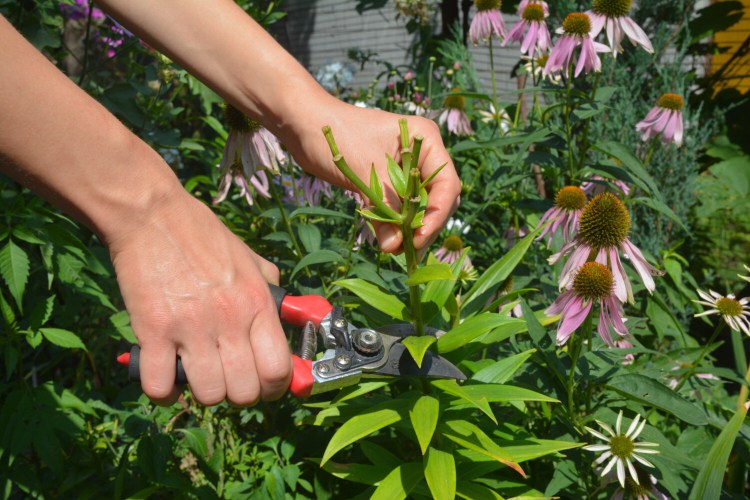Fall cleanup of our gardens has changed a lot over the 40-plus years we have lived in our house on about a half acre of land.
We always left stalks that would stand up above the snow, which provide winter interest. We deadheaded the flowers, so the plants’ energy would go to the roots instead of forming seeds. We cut and removed all perennials that flopped.
For the past few years, though, we have been letting flowers go to seed, and enjoying the volunteer plants that fill in empty spaces and give the garden a lush, full look.
The number of free plants we get this this way is astounding. The most surprising volunteer is not from a perennial but a shrub: physocarpus, or ninebark. We bought the ‘Diablo’ cultivar and planted it by our mailbox a decade ago. Over the years I’ve had to prune it a lot so we could see oncoming traffic and the postal carrier could drop off the mail.
About a yard behind ‘Diablo,’ another physocarpus sprouted, this one a combination of golden and lime green. We finally dug out the original ‘Diablo’ and are cultivating the unnamed volunteer. We have found dozens of other volunteer ninebarks in our yard. We’ve pulled them where they were too close to plants we prized and left them when we had room.
We also enjoy volunteer rudbeckia, poppies, feverfew and anything else that wants to join our garden party.
Not everyone will enjoy this freewheeling approach. Leaving plants standing does provide winter homes for small mammals such as mice and voles. And it can be less neat and organized than some gardeners prefer, but it fits the way we now think of our garden – a colorful extension of nature rather than an organized, growing artwork.
If you want to cut everything back, that’s fine with me. It’s your garden, so your preference.
Remember, compost any cuttings that are healthy but send any that are diseased – with mildew or other fungi – out with the household trash.
You also should begin cleaning out your compost bins. I began in late July, when I spread some of last year’s chopped and composted leaves after I pulled the vines of the gone-by peas. The spreading of composted leaves continues, so the bins are all empty when it is time to rake up this year’s crop of leaves. I’ll empty our bins shortly after the first frost kills tomatoes, peppers, dahlias and similar crops.
With all the leaves, mostly oaks, going into the gardens – especially the vegetable garden – I am going to add some lime to counteract the leaves’ acidity. If you haven’t done a soil test in the past few years, do one. But we have a recent test, and we know the lime will be required.
Related to leaves, lower your lawn mower for the last couple of cuts of the season. The ideal height for a lawn throughout the late spring and summer is 3 inches, because the tall grass shades out weeds, keeps the soil cool and feeds the roots. For the last two mowings, it should be 2 inches, so it is easier to rake and won’t get packed down by the heavy snow.
We grow a lot of container plants – and they will need work. The perennials and small shrubs we grow in containers will have to be transplanted to a temporary garden home. Many plants that are hardy enough to thrive in Maine won’t thrive in containers outside during the winter because the soil in exposed pots gets much colder than the soil in your yard. We temporarily put the plants in the vegetable garden and add them to pots the following spring if we can’t find a permanent home for them in our flower gardens.
Bring some plants inside – including the tender houseplants you let enjoy a fresh-air vacation on your patio or among your perennials. Many flowering plants like geraniums will survive the winter inside, so you won’t have to buy any next spring.
While fall is not the time to do extensive pruning, check your trees and shrubs to see if there are any damaged branches that should be cut. The major pruning will wait until late winter or early spring, when the plants are dormant.
It is also the time to plant bulbs, but I will be writing about that next week.
Finally, make notes about what you did this year. Even before my memory started getting worse, I never remembered as much as I thought I would. I will admit that having a computer and having to remember things for this column make keeping notes easier.
Tom Atwell is a freelance writer gardening in Cape Elizabeth. He can be contacted at: tomatwell@me.com
Comments are not available on this story.
Send questions/comments to the editors.


